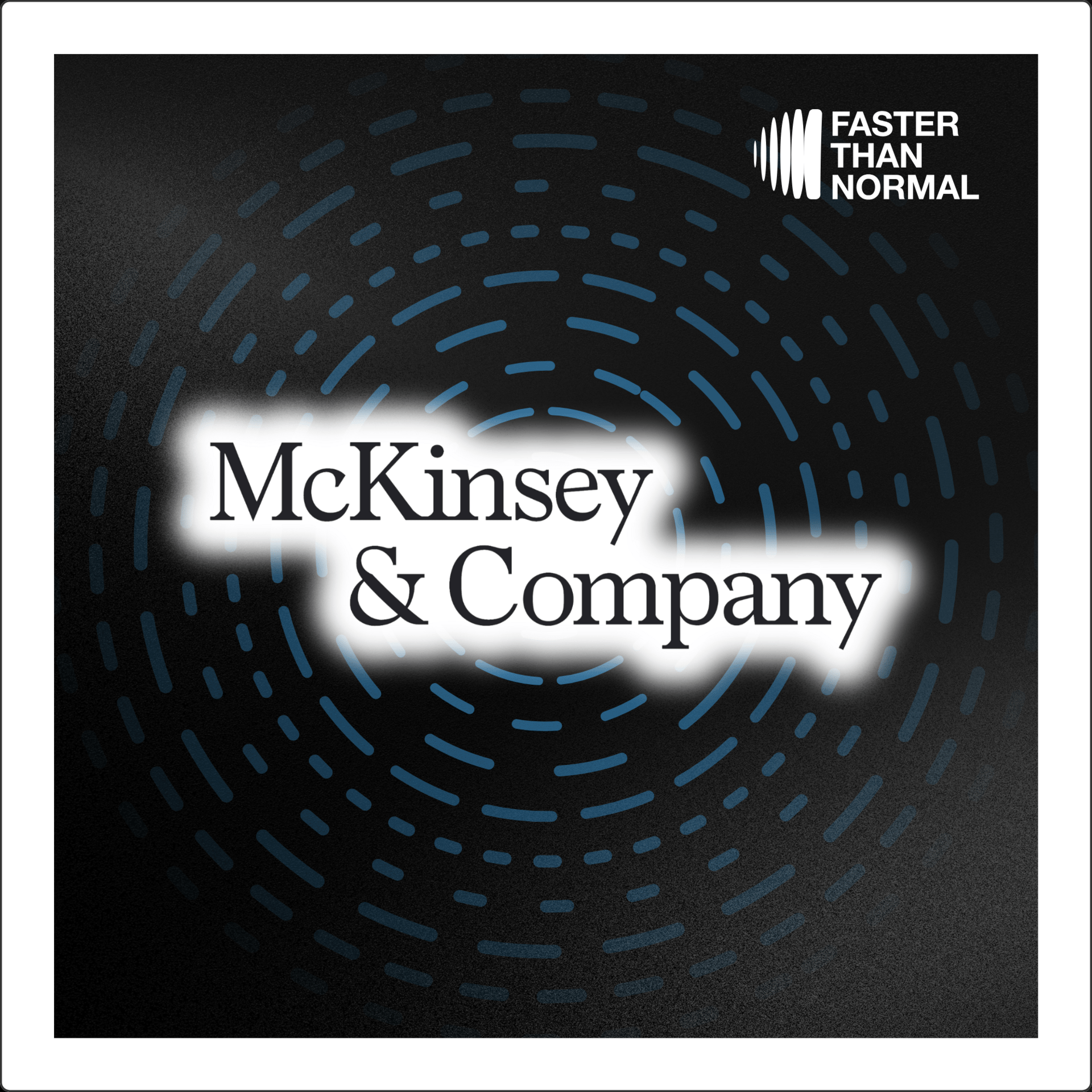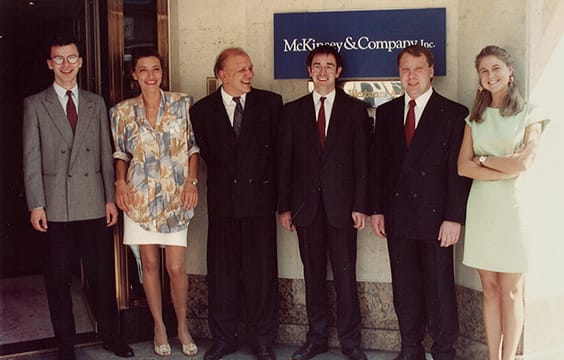August 16, 2025
•
[rtime]
mins
Mckinsey & Company
At a glance

This edition is brought to you by Athyna
Good morning to all new and old readers! Here is your Saturday edition of Faster Than Normal, exploring the stories, ideas, and frameworks of the world’s most prolific people and companies—and how you can apply them to build businesses, wealth, and the most important asset of all: yourself.
Today, we’re covering McKinsey & Company and their journey to founding a small consulting firm that, through vision, reinvention, and leadership, grew into the global powerhouse.
If you enjoy this, feel free to forward along to a friend or colleague who might too. First time reading? Sign up here.
What you’ll learn:
How McKinsey & Company redefined what it means to solve business problems
Lessons obsessing over talent, not just clients, use your alumni network as a business asset, make your culture your product
Cheers,
Alex
P.S. Send me feedback on how we can improve. We want to be worthy of your time. I respond to every email.
Mckinsey & Company

McKinsey & Company wasn't born in a garage, but it might as well have been. In 1926, James O. McKinsey started his tiny accounting and management firm with just a handful of employees in Chicago. The early days were tough. Clients were scarce. Money was tight. But McKinsey had a vision.
"We're going to change how businesses operate," he told his small team. "Not just crunch numbers, but solve real problems."
This was radical thinking for the 1920s. Most executives viewed consultants as outsiders who couldn't possibly understand their business. McKinsey disagreed. He believed rigorous analysis could unlock insights that even veteran managers missed.
The firm's big break came during the Great Depression. While other businesses crumbled, McKinsey saw opportunity. He approached struggling companies with a novel pitch: let us analyze your operations and we'll show you how to cut costs and boost efficiency.
It worked. Word spread. By the late 1930s, McKinsey was advising some of America's largest corporations. But just as the firm was taking off, tragedy struck. James McKinsey died suddenly in 1937 at the age of 48.
The firm could have collapsed. Instead, a young partner named Marvin Bower stepped up. He had a clear vision for McKinsey's future.
"We're not just consultants," Bower declared. "We're going to be the most prestigious professional services firm in the world."
Ambitious? Yes. Unrealistic? Maybe. But Bower was relentless. He instituted a rigorous hiring process, targeting only the brightest graduates from top schools. He emphasized ethical conduct and client confidentiality. And he pushed the firm to tackle the most complex business challenges.
It wasn't easy. In the 1950s and 60s, McKinsey expanded globally, opening offices across Europe and Asia. Growing pains were inevitable. Some partners resisted change. Others wanted to chase quick profits over building long-term relationships.

Bower held firm. "Our mission is to help our clients make distinctive, lasting, and substantial improvements in their performance," he insisted. "Nothing else matters."
By the 1970s, McKinsey was the undisputed leader in management consulting. But success bred complacency. The firm's fees skyrocketed. Some clients grumbled that McKinsey consultants were arrogant know-it-alls.
The wake-up call came in the early 1980s. Nimble new competitors like Boston Consulting Group started eating into McKinsey's market share. For the first time in decades, the firm's growth stalled.
McKinsey could have rested on its laurels. Instead, it reinvented itself. The firm embraced new technologies, built out its industry expertise, and expanded into emerging markets like China and India.
"We have to stay hungry," said Rajat Gupta, McKinsey's managing director in the 1990s. "The moment we think we've got it all figured out is the moment we start to decline."
Today, McKinsey is a global powerhouse with over 30,000 employees and $10 billion in annual revenue. But it hasn't forgotten its roots. The firm still prizes analytical rigor, client service, and professional development above all else.
"Our goal isn't to be the biggest," says current global managing partner Bob Sternfels. "It's to be the best - for our clients, our people, and society."
Lessons
Lesson 1: Obsess over talent, not just clients. McKinsey's success isn't just about serving clients. It's about attracting and retaining the best people. They're famously selective, hiring less than 1% of applicants. But it's not just about being picky. They invest heavily in training and development. As former managing director Dominic Barton put it, "We're a leadership factory." This focus on talent creates a virtuous cycle. The best people want to work with the best people. It's a moat.
Lesson 2: Use your alumni network as a business asset. McKinsey's alumni are everywhere. CEOs, government officials, startup founders. They don't just reminisce about old times. They're a powerful network that brings in business and spreads influence. As one former partner said, "The McKinsey alumni network is the most powerful in the world." It's not just nostalgia. It's strategy.
Lesson 3: Make your culture your product. McKinsey doesn't just sell consulting services. They sell a way of thinking. Their culture of analytical rigor and professionalism is part of what clients buy. As former managing director Ian Davis said, "Our culture is our most important asset." This culture-as-product approach makes them hard to replicate. It's baked in.
Lesson 4: Use pricing as positioning. McKinsey is expensive. Very expensive. But that's part of their strategy. As one former consultant put it, "Our high prices signal our value." They're not trying to be the affordable option. They're positioning themselves as the best. Price is part of the brand.
Lesson 5: Embrace generalists, not just specialists. McKinsey hires smart people and teaches them to tackle any problem. This generalist approach lets them adapt to new industries and challenges. Former CEO Marvin Bower said, "We solve the toughest problems." Not just in one area. In any area. Its flexibility is a competitive advantage.
Hire remote employees with confidence
Two years ago, I hired an offshore assistant , and it’s been one of the best decisions I’ve made. From marketing to customer support, it’s helped streamline work and boost productivity.
Athyna is a service that finds top remote employees in <5 days in Latam, Africa, and Sth East Asia. They cover roles in finance, creative, engineering, and product, sourcing top talent from companies like Google, AWS, Microsoft, and more.
If you’re in the market for talent, visit their website to explore options and cover all your hiring needs.
Book Recommendations
Further Readings
That’s all for today, folks. As always, please give me your feedback. Which section is your favourite? What do you want to see more or less of? Other suggestions? Please let me know.
Have a wonderful rest of week, all.
Recommendation Zone
⎯
Hire remote employees with confidence
Two years ago, I hired an offshore assistant for the first time. Since then, I’ve recommended many people do the same. It’s been one of the highest leverage things I’ve done, helping with everything marketing and customer support (for The Intelligence Age) and personal matters and email management.
Athyna is a service that quickly (<5 days!) finds remote employees across 150+ countries for you or your team. They cover roles from sales and marketing to creative and product, and have worked with companies like Facebook, Zoom, Uber, Microsoft, Salesforce, and Amazon.
I’ve personally used Athyna and recommended them to my Brother, Will, who runs a fashion label, and several close friends running their own businesses. To date, they’ve all had very positive experiences.
If you’re in the market for talent, visit their website to explore options and cover all your hiring needs.


Alex Brogan
Find me on X, LinkedIn, YouTube, Instagram, TikTok
Offshore Talent: Where to find the best offshore talent. Powered by Athyna.
Why Faster Than Normal? Our mission is to be a friend to the ambitious, a mentor to the becoming, and a partner to the bold. We achieve this by sharing the stories, ideas, and frameworks of the world's most prolific people and companies—and how you can apply them to build businesses, wealth, and the most important asset of all: yourself.
Faster Than Normal is a ‘state' of being’ rather than an outcome. Outlier performance requires continuous, compounded improvement. We’re your partner on this journey.
Send us your feedback and help us continuously improve our content and achieve our mission. We want to hear from you and respond to everyone.

Interested in reaching Founders, Operators, and Investors like you? To become a Faster Than Normal partner, apply here.
.png)
.png)